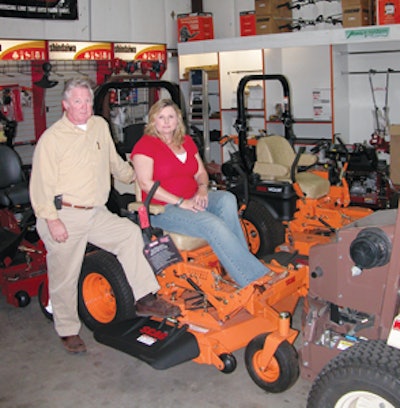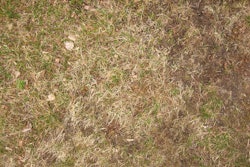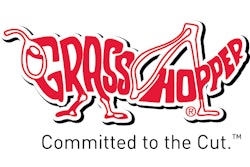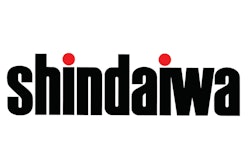
Quik-Kut Hi-Performance Lawn Equipment was founded as a Rotary distributorship in 1985 by Hinton DeLoach and Bruce Purcell. The company built its reputation as a parts house before branching into equipment sales a few years later, becoming one of the first Scag dealers in southeast Georgia. "When we first started out, you had to drive all the way to Atlanta to find a commercial mower," says Quik-Kut manager Bruce Purcell. "Now there are nine zero-turn brands within a three-mile radius of our main store in Claxton. But we were one of the first with Scag some 20 years ago, so we sort of got an early start with selling commercial lawn equipment."
Quik-Kut proceeded to build up a good commercial customer base, roughly half of which were governmental accounts. Unique services designed to set the dealership apart from other area dealers helped win business from landscapers and homeowners. Quik-Kut also continued a substantial parts operation.
Sales growth accelerated a few years ago. That, coupled with an emerging, virtually untapped market roughly 40 miles away, prompted the decision to expand.
"We were growing very well in 2005—right up until July," Purcell says. "We decided the time was right to open a second store in Hinesville, about 40 miles southeast. Fort Stewart and Wright Army Air Field are down there, and the area was booming from military growth, so we went for it."
Then everything changed when Hurricane Katrina hit the Gulf Coast in August 2005. The federal government sent billions of dollars to the area to help it recover from the country's worst natural disaster. At the same time, the War in Iraq was raging, so government spending in many areas was drastically reduced. "My governmental accounts purchased strictly what had to be purchased for immediate use," Purcell recalls. "Instead of 20 blades they would only order five."
Then the drought set in. South Georgia finished around 12 inches behind in rainfall for 2005 and another 16 inches for 2006.
Purcell tells, "Grass wasn't growing, so landscapers were hurting. Pecan growers had a bad year, as well as hay, cotton and other farmers who were consistently good customers but just weren't able to buy from us like they usually did. Even the crab and shrimping industries were feeling it because crab and shrimp need a certain amount of fresh water to reproduce in the marshes and creeks. The timber industry was affected because more trees became accessible with the dry weather conditions." Oh yeah … gas prices were skyrocketing, too, putting a real damper on consumer confidence.
"We couldn't have picked a worse time to expand," Purcell says. "I realized I was really going to have to dig in to make it work."
Crisis Control
The tendency is to want to sell yourself out of a downturn, Purcell says, but that clearly wasn't going to happen. "You can't put someone in a headlock and force them to buy a mower, especially in a dust bowl," he adds. So Purcell brought in an analyst to help find ways to cut expenses until the market turned back around. By pinpointing just a few line items in the budget, the dealership put roughly 3% back to the bottom line.
For example, Quik-Kut had five insurance policies: vehicles and trailers, building and contents, health, life and workman's compensation. The annual cost was $48,500. Purcell sat down with his insurance agent to readjust his policies while still allowing for adequate coverage. Monthly premiums were cut in half.
The dealership was paying $1,200 a year for bottled water. "We have water fountains," Purcell relates. "I don't even remember how it came about that we thought we needed bottled water. So we got rid of it."
Similarly, Purcell saw uniforms as a large cost. He realized employees could still look professional by adhering to a dress code, so the $4,800 a year the dealership was paying for uniforms was put to a halt.
At the same time Purcell was making some hard cuts to the budget, a technician left. Purcell hasn't hired a replacement, and doesn't foresee the need to right now.
Finding demand
The budget cuts would buy some time for Quik-Kut until the market turned around in 2006, Purcell hoped. The long-anticipated up-tick, however, was slow-coming. As pointed out earlier, rainfall in the Claxton area was off another 16 inches last year.
Finally, in early September, the area got some rain—to the tune of about four inches. The grass started growing and the buzz of lawn mower engines could once again be heard. Then it was like flipping a switch. The rain stopped, and business in October and November was down again. "I spent a lot of time praying for rain," Purcell says.
He also spent a lot of time—and attention—on the residential market. "The American dream down here is a house on three acres with a pond," Purcell tells. "When someone realizes his dream, he's tied up all day Saturday mowing the grass. In the spring he comes in here telling me he wants a zero-turn. But because we only sell top-of-the-line product, price can sometimes get in the way, even though the customer is ready to buy from us."
Purcell says one of the best things he's ever done is sign on with Sheffield Financial. A few years ago, Quik-Kut won a trip to Las Vegas. "We had a great time with the folks from Sheffield, but also learned how much financing can help sales, especially in the off-season," Purcell says. "The people at Sheffield are great. The credit application process is a piece of cake for our customers as well as our staff. And we get paid in three days. It's really a no-brainer."
Financing has been invaluable as Quik-Kut's business has shifted more to farms and large landowners. When the grass isn't growing, you have to give the customer another reason to make a purchase. So far, financing has proved to be the answer—or at least one of them.
Purcell has found another hot-button selling point: year-end tax savings. It, along with financing, helped Quik-Kut sell a dozen zero-turns in December to finish 2006 strong.
Creating Separation
Over the years, Purcell has created an assortment of services to help, as he likes to put it, create separation between his dealership and some of the others. "I tell a customer, ‘If you buy one of our mowers, I'll make you like it," he says.
Product demos. Quik-Kut hits the road with several trucks and trailers, providing demos for landscapers, governmental agencies, farmers and even homeowners. Purcell says he personally handles many of the demos, often in the evening hours or on Saturdays. Quik-Kut also has a very good demo area on-site at the dealership with several units gassed-up and ready to be test-driven.
Purcell's son Daniel, who just graduated from college with a bachelor's degree in business management, says on-site repair is another service that helps Quik-Kut create separation. "Some of our customers are busy during the week and don't have a chance to bring their mower in for repair," Daniel says. "If it sounds like a minor repair that can be handled in the customer's driveway, we'll send somebody there."
Offering services like these can become costly, but Purcell says it's well worth it. "I had a rep tell me once that we go too far to try and please our customers," he says. "To me, though, it all comes down to where you are. We're out in the country with a county population of 10,000. To keep your numbers up you have to go the extra mile and try harder.
"Sometimes I have to get a little creative to sell equipment," Purcell continues. "I don't just sell here at the dealership. In January and February I'm laying the groundwork. I'm visiting customers, going to trade shows and seminars, and sending out flyers. When the fish start biting, I want to catch as many as I can."
Suppliers. "We want to be known for selling high-performance equipment," Purcell points out. "We truly owe a lot to our suppliers. Every single one of them has helped us survive a tough time—and it's not over yet."
Back to normal?
If all goes well and things return to normal weather-wise, Purcell is hoping for a very strong 2007. He's already trimmed about $60,000 worth of fat from his business, and continues to look for more. Quik-Kut will continue to rely on outside sales and on- and off-site demos to gain new customers, especially from the increasingly important large landowners segment. Purcell, along with his sales rep stationed in Atlanta (Guy Monroe), will continue to look for "dead spots" outside the dealership's typical 50-mile market area to sell even more equipment and parts.
Purcell also remains optimistic about the Hinesville store, although it's struggled thus far. "It's in a great location in an area that's seeing positive growth," Purcell points out. "With great support from manager Scott Barnett and technician Matt Anderson, the future looks bright for this store. The area is growing to support the military families moving in, and it will continue to boom for the next few years. I want to hang in there so we can capitalize on it."
The willingness to make some tough cuts and the eagerness to find new, creative ways to sell equipment has given this southern Georgia dealership a chance to do just that. "You have to really love this industry in order to put forth the effort required to be successful," Purcell says. "I love this industry."




















